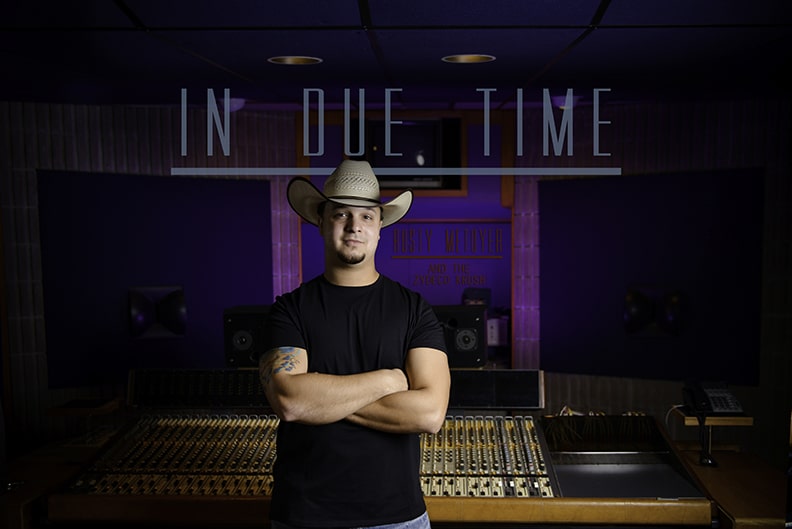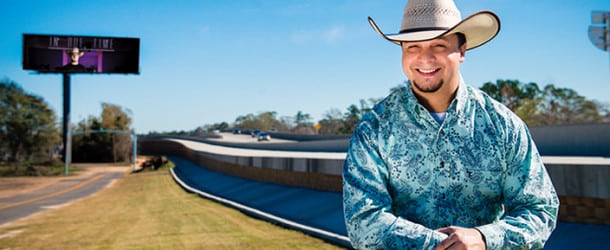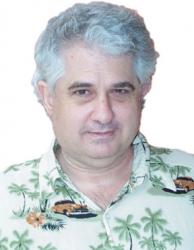Rusty Metoyer’s ‘Nouveau Zydeco’ Keeps Old Family Traditions Alive
Story By Brad Goins • Photos By Lindsey Janies
Of his second zydeco CD, In Due Time, Rusty Metoyer says, “I’ve been pushing it hard.”
Part of his devotion to the recording is no doubt due to the sweat equity he put into it. Metoyer recorded the entire disc in Cecil Green’s studio in Ville Platte. He told me he often drove to Ville Platte when he finished his local school bus route. (Metoyer began driving a bus for the Calcasieu Parish School Board in the fall of 2013. He says the flexibility of the job makes it “pretty much the best job I can have for my schedule as a musician.”)

That means Metoyer only got four or fewer hours of sleep three nights a week. And he did that for a year, as that’s the amount of studio time it took to get In Due Time ready to drop.
While he’s pushing the CD, it’s not an obsession with him. Metoyer’s “main focus,” he says, “is shows. But to get shows, you have to put music out there.”
Since the release of In Due Time, Metoyer’s seen an increase in invitations to play at festivals and “nice night clubs.” This year, he’ll play at the Festivals Acadiens et Creoles in Lafayette for the first time. He’s wanted to play at the event for years.
At this stage of the game, the concert work is steady. “We play at least one show every weekend,” he says.
International Musician
Although I didn’t ask Metoyer what he felt the greatest accomplishment in his young life has been, many would certainly point to his work with the Cajun and Zydeco Festival in Saulieu in the Burgundy region of France.
Metoyer’s gotten this and other big European gigs through old-fashioned networking. When he first played the Saulieu festival in 2012, the then-19-year-old musician gave some zydeco fans from Holland a demo of his song “Think About Love.” They listened to it, then arranged to have Metoyer interviewed on a radio station in Rammsdonksveer in the Netherlands.
That interview led to an invitation to play at Netherlands’ Zydeco Zity festival in May of 2015. (On YouTube, you can see Metoyer and his band, The Zydeco Krush, play a five-minute long version of “Shake My Tree” at the festival.)
At that event, he talked with Didier Lonjard, the director of the festival in Saulier, France. The conversation would lead to an invitation to this year’s festival (where Metoyer will be performing when this magazine hits the stands).

“In that part of Europe,” he says, “they have a big accordion culture. You’d be surprised. They love everything about Louisiana. They’re familiar with the accordion. They understand the French [in the song lyrics].” Metoyer notes that French attempts to imitate Cajun food specialties aren’t always great successes. “They don’t have Cajun food down,” he says. But aside from this minor point, there’s an extensive cultural overlap.
In addition to playing the European circuit, Metoyer has now had gigs on both the east and the west coast of the U.S. He seems perfectly comfortable with his role as a musician with international reach.
“I thrive on new places; new faces; [on] introducing my brand of zydeco to people who might not have heard of me.”
Adaptable Performer
Part of Metoyer’s comfort factor with unfamiliar locales is a result of his confidence that as a performer, he can read and react to any audience.
“We can adapt to any crowd,” he says, “even if they’re not zydeco fans. I throw in something that can relate to everybody. I can read a crowd pretty good.”
Metoyer’s type of zydeco is sometimes called “nouveau zydeco.” As he explains it, “I’m not an old school musician, but I do play old school music.” Thus, at his shows, he might play a Clifton Chenier tune from the 1960s, then follow it with one of his own zydeco compositions with a “modern country” feel.
Metoyer tends to work in the modern country sound. “Anyone who can relate to zydeco can relate to country; [they’re both] about having a good time, dancing, food, being in the country.”
But again, Metoyer always makes it a point to adapt to the audience at hand. While he might be inclined to put in an Alan Jackson song, he won’t hesitate to play a James Brown or Sam Cooke or Parliament number if that’s what the audience wants.
Self-Taught
Metoyer is known for being a self-taught musician. This is especially remarkable since both his grandfathers were established Creole musicians who could have instructed him. Cornelius Papillon played accordion and fiddle and Louis Metoyer played drums and bass. His older uncles, aunts and cousins also sang French Creole songs when Rusty was a child.
Of course, Cajun Louisiana lore is full of stories of children who learned to play the accordion on grandpa’s knee. It didn’t work out exactly that way for Metoyer.
For a decade, his Papillon grandparents lived with Rusty’s family. They spoke fluent French — primarily when they wanted to share information without having others understand it.
Rusty grew up singing the French Creole songs of his older relatives. But he didn’t know what the French words meant. And as a youth, he still hadn’t really hooked into the music.
When he was 10, an uncle gave him a Horner accordion. Rusty remembers that he played with the gift for about two weeks.
Although he was precocious — he learned to play one song just by listening to it on the radio — his burning interest at this young age was sports. He soon put the accordion aside in favor of the playing field. He’d go on to play football at St. Louis High School.

Metoyer’s gradual orientation to music grew out of the family tradition of holding large gatherings on holidays. Those who could play an instrument brought it out and performed at these gatherings. At some point, Metoyer realized, “I didn’t want that to die.”
He began his return to the accordion by mimicking what he heard on old Keith Frank, Step Rideau and Geno Delafose tapes. He’d play a song and try to play along on the accordion. Then he’d press rewind and start the whole process again.
“It sounded bad at first,” he says. “After a few months, it started sounding like something.” He supplemented his studies by watching performances of accordion players on YouTube videos.
At first, Metoyer played only for his family. A major transitional event for him was the funeral of his grandmother Cecilia Papillon at St. Henry’s Catholic Church in Lake Charles. The officiating priest was convinced Metoyer was ready to play “Amazing Grace” at the funeral; Rusty wasn’t so sure.
But he cobbled together a band with a few church members and friends.
The performance of “Amazing Grace” was considered a success, and Metoyer kept doing what seemed to be coming naturally. As he moved from St. Louis to McNeese, he started playing drums with Corey Ledet — another young musician with a Creole background who’d begun performing zydeco live in Houston at the age of 10.
In spring of 2011, Metoyer got two big back-to-back gigs, playing the local Taste of Louisiana and Crawfish Festivals. “I felt improvement in myself as a singer, accordion player and performer,” he says.
Metoyer Gets Zapped
It became customary for Metoyer to find himself playing on stage with well-known Cajun and zydeco musicians. But it was an invitation to play at the Contraband Days festival that gave him his big “starstruck” moment.
In the Metoyer household, the albums of the ‘70s and ‘80s funk band Zapp were family favorites. Metoyer’s parents loved the recordings, and to young Rusty, the surviving members of the band were idols.
One day, Metoyer got a call he couldn’t possibly have anticipated. He was asked to open for Zapp at the Contraband Days Festival.
After Metoyer’s performance, he and his family sat through the Zapp show. Afterwards, one of the remaining Troutman brothers — original founders of the band, two of whom survive — talked with the family for an hour and treated them to a tour of the Zapp bus. “That was a big moment for me as a 20-year-old musician,” Metoyer says.
Still Learning
Since he first began to perform at family get-togethers, Metoyer has worked hard to learn the French lyrics, language and songs that he wasn’t all that attentive to in his youth.
“I really don’t like [to do] something unless I really know about it … the history … why we do this … I’m still in the process of learning that … I don’t do anything unless I’m 100 percent about it.”
If he gets stuck in his French music studies, he calls up his great aunt Mary Papion, who draws on her vast store of experience to give him the answers he needs.
The Need To Be Thankful
Metoyer takes a savvy, systematic approach to building his musical career. He takes things one step at a time.
He’s affable; communicates easily; and doesn’t have a chip on his shoulder. He’s accomplished a lot for someone of his young age.
Some of the big messages Metoyer wants to relate to the public concern the matter of thankfulness. He says, “thank you to everybody who’s ever supported me. I’m living a dream I never thought possible. It’s only possible because of the people who support me. I appreciate that tremendously.”
















Comments are closed.